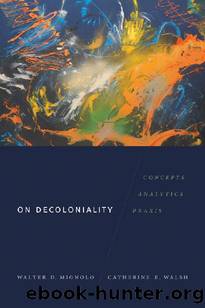On Decoloniality by Walter D. Mignolo & Catherine E. Walsh

Author:Walter D. Mignolo & Catherine E. Walsh [Mignolo, Walter D. & Walsh, Catherine E.]
Language: eng
Format: epub
Publisher: Duke University Press
Published: 2018-06-02T00:00:00+00:00
Notes
1â â â â â â See the recent detailed Ebrahim Moosa study and autobiographical narrative, What Is a Madrasa? (Chapel Hill: University of North Carolina Press, 2015).
2â â â â â â For a panoramic vista of this history, see my âGlobalization and the Geopolitics of Knowledge: The Role of the Humanities in the Corporate University,â in The American Style University at Large, 3â41 (Lanham, MD: Lexington Books, 2011).
3â â â â â â Siba Grovogui, Otherwise Human: The Institutes and Institutions of Rights, accessed May 30, 2016, http://sibagrovogui.com/current-projects/otherwise-human-the-institutes-and-institutions-of-rights.
4â â â â â â AnÃbal Quijano, âColonialidad del poder y subjetividad en América Latina,â in Decolonialidad y Psicoanálisis, ed. MarÃa Amelia Castañola and Mauricio González, 11â34 (Mexico City: Ediciones Navarra and Colección Borde Sur, 2017).
5â â â â â â Sylvia Wynter, âUnsettling the Coloniality of Being/Power/Truth/Freedom: Towards the Human, After ManâAn Argument,â New Centennial Review 3, no. 3 (2003): 257â337.
6â â â â â â See â(De) Coloniality at Large: Time and the Colonial Difference,â in Walter D. Mignolo, The Darker Side of Western Modernity: Global Futures, Decolonial Options, 118â48 (Durham, NC: Duke University Press, 2011); âThe Moveable Center,â in The Darker Side of the Renaissance: Literacy, Territoriality and Colonization (Ann Arbor: Michigan University Press, [1995], 2003), chap. 5; Daniel Astorga Poblete, âLa colonización del Tlacauhtli y la invención del espacio en el México colonial,â PhD dissertation, Duke University, 2015, http://dukespace.lib.duke.edu/dspace/handle/10161/10448; âModernity and Decoloniality,â Oxford Bibliography Online, 2011, accessed May 27, 2016, http://www.oxfordbibliographies.com/view/document/obo-9780199766581/obo-9780199766581-0017.xml.
7â â â â â â For an update on the social struggles in the Andes that called for âcoloniality,â see Catherine Walshâs part I of this volume.
8â â â â â â Postmodern critiques of representation have been eloquently advanced by Michel Foucault, Les mots et les chose (Paris: Gallimard, 1967) and by Richard Rorty, Philosophy and the Mirror of Nature (Princeton, NJ: Princeton University Press, 1982). For a decolonial critique of representation, see Rolando Vázquez, âColonialidad y relacionalidad,â in Los desafÃos decoloniales de nuestros dÃas: Pensar colectivo, ed. MarÃa Eugenia Borsani and Pablo Quintero, 173â97 (Neuquén, Argentina: Universidad del Comahue, 2014).
9â â â â â â Research, analysis, and reflections on coloniality of being and of subjectivity (racism and sexism) are due to forward-thinking MarÃa Lugones and Nelson Maldonado-Torres. From Lugones, see âHeterosexualism and the Colonial/Modern Gender System,â Hypatia 22, no. 1 (2007): 186â209, and âToward a Decolonial Feminism,â Hypatia 25 (2010): 742â59; from Maldonado-Torres, see âOn the Coloniality of Being,â Cultural Studies 21, no. 2 (2007): 240â70.
10â â â â âModernity and Decolonialityâ Oxford Bibliography Online, 2011, accessed May 27, 2016, http://www.oxfordbibliographies.com/view/document/obo-9780199766581/obo-9780199766581-0017.xml.
11â â â â For a detailed account of Ãmile Benvenisteâs displacement from the signified/signifier to the enunciation, see my âEpistemic Disobedience, Independent Thoughts and Decolonial Freedom,â in Theory, Culture and Society 26, nos. 7/8 (2009): 1â23.
12â â â â Mignolo, âEpistemic Disobedience.â
13â â â â Mignolo, âEpistemic Disobedience.â
Download
This site does not store any files on its server. We only index and link to content provided by other sites. Please contact the content providers to delete copyright contents if any and email us, we'll remove relevant links or contents immediately.
| Anthropology | Archaeology |
| Philosophy | Politics & Government |
| Social Sciences | Sociology |
| Women's Studies |
The Leavers by Lisa Ko(6471)
Born to Run: by Christopher McDougall(6258)
iGen by Jean M. Twenge(4702)
Sapiens by Yuval Noah Harari(4534)
The Kite Runner by Khaled Hosseini(4430)
Spare by Prince Harry The Duke of Sussex(4195)
Bullshit Jobs by David Graeber(3179)
Livewired by David Eagleman(3121)
Goodbye Paradise(2957)
Never by Ken Follett(2878)
A Dictionary of Sociology by Unknown(2517)
Harry Potter 4 - Harry Potter and The Goblet of Fire by J.K.Rowling(2416)
The Club by A.L. Brooks(2357)
People of the Earth: An Introduction to World Prehistory by Dr. Brian Fagan & Nadia Durrani(2346)
The Social Psychology of Inequality by Unknown(2309)
Machine Learning at Scale with H2O by Gregory Keys | David Whiting(2283)
Harry Potter and the Order of the Phoenix (5) by J.K. Rowling(2226)
0041152001443424520 .pdf by Unknown(2219)
Don't Sleep, There Are Snakes by Daniel L. Everett(2216)
